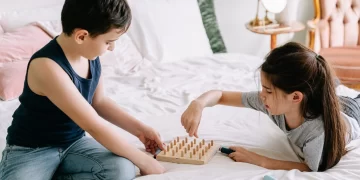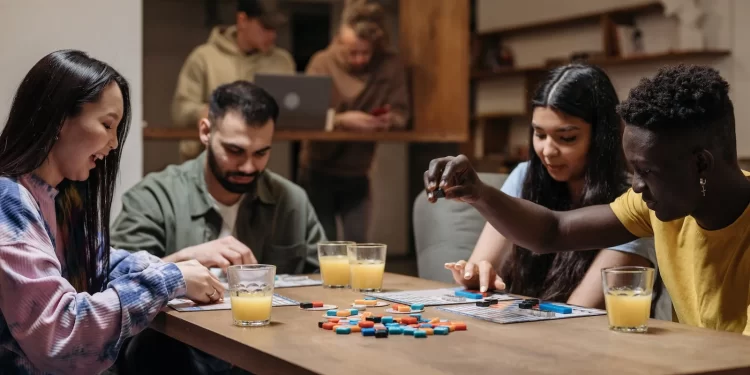
Board games are tabletop games that typically use pieces for your family and friends. These pieces are moved or placed on a pre-marked board (playing surface) and often include elements of table, card, role-playing, and miniatures games as well. Playing popular board games for a fun evening with friends and family is a fantastic way to bond, laugh, and create lasting memories.
Here are some steps to help you organize a successful board game:
1. Choose the Games:
- Decide on the board games you want to play. Consider the age group and preferences of your friends and family. You can mix classic games like Monopoly and Scrabble with modern favorites like Settlers of Catan or Ticket to Ride.
2. Set the Date and Time:
- Pick a convenient date and time that works for everyone. It could be a weekend evening, a holiday, or any day that suits your group’s schedule.
3. Prepare the Space:
- Create a comfortable and inviting gaming area. Arrange tables and chairs to accommodate all players. Ensure there’s enough lighting, especially if the games have small pieces or cards.
4. Snacks and Refreshments:
- Plan a menu of snacks and refreshments. You can go for finger foods, pizza, chips, and beverages. Don’t forget to accommodate dietary preferences and restrictions.
5. Game Setup:
- Before guests arrive, set up the games you’ve chosen. This includes arranging the game boards, pieces, cards, and any other components.
6. Explain the Rules:
- If some of the participants are new to the games, take the time to explain the rules. Make sure everyone understands the objectives and how to play. Most games come with instruction booklets that can be a helpful reference.
7. Divide into Teams:
- Depending on the games you’ve selected, you might need to divide into teams. Some games are best enjoyed with partners or in small groups.
8. Start Playing:
- Once everything is set up and everyone understands the rules, start playing. Encourage friendly competition and lots of laughter. Board games are as much about the experience as they are about winning.
9. Rotate Games:
- Consider rotating through different games throughout the evening. This keeps things fresh and allows everyone to participate in their favorite games.
10. Enjoy the Interaction:
- The best part of a board game night is the social interaction. Take breaks to chat, share stories, and catch up with friends and family.
11. Stay Relaxed:
- Remember, the goal is to have fun. Don’t get overly competitive or stressed about winning. Enjoy the company and the game itself.
12. Prizes or Rewards:
- If you want to add an extra element of excitement, you can offer small prizes or rewards for winners. It could be something as simple as a trophy or a humorous certificate.
13. Capture the Moments:
- Don’t forget to capture the fun moments with photos or videos. These memories will be cherished for years to come.
14. Wind Down:
- As the evening comes to a close, wind down with a few more snacks and perhaps a round of your favorite game.
15. Plan Future Game Nights:
- Board game nights are so enjoyable that you’ll likely want to make them a regular occurrence. Plan future game nights and rotate the games you play.
Benefits of Playing Board Games:
Playing board games is entertaining, but that is only one benefit of board game playing. There has been quite a resurgence in the popularity of board games, and for many people, playing board games connects them with their past. A few of the many benefits are the following.
Playing board games can bring people closer, strengthen relationships, and can help you meet new people.
- Board games can be for two or more players. The foundation of board game playing is cooperation. It requires players to engage in teamwork. It is the perfect way to spend time in nice company and strengthen bonds with other human beings.
Playing board games increases brain function.
- Playing is an exercise for your brain. Playing stimulates brain areas that are responsible for memory formation and complex thought processes for all ages. Engaging in play assists in practicing essential cognitive skills, such as decision-making, higher-level strategic thinking, and problem-solving.
Playing board games teaches you how to set goals and be patient.
- Winning takes strategy and patience. In a happy environment, these things are learned in a stress-free and challenging but fun way.
Playing board games is great for reducing stress and makes for laughter.
- A side effect of board game playing is laughter. It is one of the vital ingredients for an enjoyable learning experience and increasing creativity. Also, laughing and having a good time in general helps to decrease stress.
Playing board games creates more happiness.
- Playing board games triggers the release of endorphins, the body’s natural “feel-good” chemicals. “Happy hormones” have the power to improve conscious and unconscious mind functions, leaving a person feeling cheerful, compassionate, and ultimately content.
Playing board games enhances creativity and self-confidence.
- Playing board games is a perfect opportunity to connect and open up; it also helps to display a creative side of personality in non-intrusive ways, which can be beneficial for quiet individuals. Board games are an amazing tool for shy children and timid adults. Playing helps them to develop stronger senses of individuality and creativity. This leads to greater self-esteem and a feeling of being included and noticed.
You can play board games anywhere at any time.
- There are no restrictions, no pressure! It’s one of the greatest things that board games can be played anywhere and anytime. The possibilities are endless! You may feel excited, adventurous, courageous, or, perhaps, even lonely and sad, but there’s always a chance to play and connect with like-minded people.
How to Play More Board Games
Wanting to play more board games? Fitting games into a busy family schedule can be a challenge. These simple tricks can help you get more games to the table so you and your family can spend quality time together.
Between our 6 children, careers, keeping a house in order, and running our blog and social media sites, it’s hard for us to fit in all the gaming we want to do as a family too! Often the gaming we do most is with our kids — meaning that the date night games my husband and I love to play together fall through the cracks. We struggle to get the adult games we are really wanting to pay to the table. To combat this, we use these tricks to help make sure that we’re spending our time the way we want to.
1. Set out the games you want to play
You know what they say: “Out of sight, out of mind.” By intentionally setting out the game(s) you want to play you are making it that much easier to get the game to the table. It also removes the decision fatigue from answering “What game do you want to play?” because you’ve already answered it with your selections.
We recommend setting them out on a particular day. Perhaps you play games most often on the weekends, so maybe you’ll choose a game or two to set out on Thursday evening. Choose a spot that’ll be visible — perhaps your family room or a counter by the dining table. Somewhere you see frequently. We have a specific shelf that is just for games we want to play in the immediate future. Whenever someone asks or we have time to play a game, we can look over at the shelf and choose one to play.
2. Unplug your TV
If you find yourself watching TV most nights rather than playing a game, try creating an obstacle to the TV.
About 6 years ago I wanted to make an intentional shift in our family life. I didn’t want the TV to be an activity we chose anymore simply because it was convenient. I started unplugging the TV and a few things happened. Turning on the TV wasn’t nearly as easy anymore so we just didn’t. Our kids stopped asking to watch shows, we stopped turning it on after a long day, and in general, we began forgetting that the TV was even there.
Creating even just a simple, though annoying extra step to watching TV reminded us that we actually didn’t want to watch it anyway. So we grabbed a game and played together instead. This eventually led to 5 years of not having a TV in our home at all.
3. Buy a game you’re excited about
Few things will hinder getting game night started quite like being bored with what games you have available. Much like you might buy cute workout clothes when starting a new program, give yourself permission to get that new game you’re excited about to help you meet your goal of playing more games! When we were young and newly married, we worked into our (very) small budget enough to buy one new game a month and we’d play the heck out of it for that month guilt-free.
4. Ease Your Pain Points
Think about what is stopping you from playing games most and then solve those problems. Maybe you love to play games but you hate learning the rules. Try watching a walkthrough of the game rules on YouTube! One of the rules channels we love is Watch it Played. There is almost guaranteed to be a rules explanation video for your game if you search for one!
It can also be helpful to watch a play-through video of a game to see how a few rounds are played, especially if you are a visual learner. There are lots of channels that do play-throughs, we really enjoy those put out by Jon Gets Games!
5. Put Game Night On Your Schedule
Make time for what you love! Put your game night on your schedule and treat it like you would any other event you’d look forward to. Whether you’re wanting a once a month game night with friends or a weekly family game night, by scheduling it, you’ll keep that time slot open and be reminded when looking at your calendar.
6. Play Your Game First
If you’re like me, you might find yourself doing one thing after another trying to get the house in order before bedtime, and suddenly the time is gone and it’s too late. It’s okay to save the chores for later so you can get right to family game night. When Adam and I have a date game planned, we play it first. Then we can get to whatever else needs our attention after we’ve finished.
7. Toss a Game in Your Purse
If you’re heading out, toss a game in your purse or car’s glove box. I love bringing along a short, quick game so that if I find myself in a waiting room or restaurant table and need to entertain my kids I can pull out a game and engage them quickly.
It’s also great if you’re heading over to a relative’s house! I’ll always toss in a small card game that’s easy to teach. I’ve done it so often now that my family is excited to see what game I’ve brought each visit!
Why do people play board games?
People play board games for a variety of reasons, as they offer a range of benefits and experiences that can cater to different motivations and preferences. Here are some of the most common reasons why people play board games:
1. Entertainment: Board games are an enjoyable form of entertainment. They provide a break from routine and offer a source of amusement and fun, whether you’re playing with friends, family, or even solo.
2. Social Interaction: Board games encourage social interaction and bonding. They bring people together, allowing them to spend quality time with friends and family while engaging in a shared activity.
3. Cognitive Stimulation: Many board games require critical thinking, strategy, and problem-solving. They stimulate the brain and enhance cognitive skills like decision-making, planning, and memory.
4. Competition: The competitive aspect of board games can be a strong motivator. People enjoy the challenge of outsmarting opponents and strive to win, which adds excitement and motivation to play.
5. Relaxation: Playing board games can be a relaxing and stress-relieving activity. It provides an escape from daily pressures and offers a chance to unwind.
6. Learning Opportunities: Board games often have educational components. They can teach players about history, geography, mathematics, vocabulary, and more, making learning fun.
7. Creativity and Imagination: Some board games encourage creativity and imaginative thinking. Players may build, design, or create stories within the game’s framework.
8. Nostalgia: Many adults have fond memories of playing board games during their childhood. Nostalgia can be a strong driver, as it allows people to relive those positive experiences.
9. Teamwork and Collaboration: Certain board games promote teamwork and collaboration. Players must work together to achieve a common goal, fostering cooperation and communication.
10. Community and Events: Board games are often part of larger social communities. People participate in board game nights, conventions, and events to connect with like-minded enthusiasts.
11. Competition with Friends and Family: Friendly competition within the family or among friends is a common reason to play. Board games offer a structured, fair, and enjoyable way to compete.
12. Portable Entertainment: Many board games are compact and portable, making them suitable for travel and outdoor activities. They provide a source of entertainment wherever you go.
13. Technological Respite: In an era of constant digital connectivity, board games offer a screen-free alternative for recreation, allowing people to disconnect from technology.
14. Skill Development: Playing board games can improve various skills, such as communication, critical thinking, and strategic planning, which can have practical applications in everyday life.
15. Escapism: Board games transport players to different worlds, whether it’s a fantasy realm, historical setting, or space adventure. This escapism offers a temporary break from reality.
In essence, people play board games because they offer a diverse range of experiences and cater to a wide array of motivations. Whether it’s the joy of competition, the desire for intellectual stimulation, or the need for social interaction, board games have something to offer to virtually everyone.
FAQ:
1. What is the secret to a good board game?
A good game should have short turns with a limited number of actions per turn-on. I think reference cards explaining those actions are usually a very good idea and help with the flow of the game and there’s one other final point here an obvious way to keep players involved in the game is not to eliminate them.
2. How do you play top that board game?
When the challenge card is flipped over, players race to stack their objects in 1 single pile following 3 simple rules: objects printed in color must be visible on the stack, objects printed in grey must be hidden INSIDE objects on the stack, and objects surrounded by stars must be kept empty.
3. What makes a board game fun?
Modern board games can be wonderfully complex and intricate, weaving a web of overlapping mechanics, visual design, and narrative to create a fun and memorable experience every time you play.
4. What are popular board games?
Following chess, checkers, backgammon, Monopoly, and Scrabble are among the top five most popular board games. Whether you like to play the best card games or prefer to think step by step ahead in one of your favorite strategy board games, one of these classic board games will suit your taste.
We play board games for many reasons, more than even listed above, but the main reason is, without a doubt, for the experiences it provides between us and our family and friends. We love being able to gather around a table, phones aside, and spend time connecting with people, old friends and new.
Remember that the key to a successful board game night is to create a relaxed and enjoyable atmosphere. It’s not about who wins or loses but about the quality time spent with loved ones. So, choose your games, set the date, and get ready for a fantastic evening filled with fun and laughter.


































